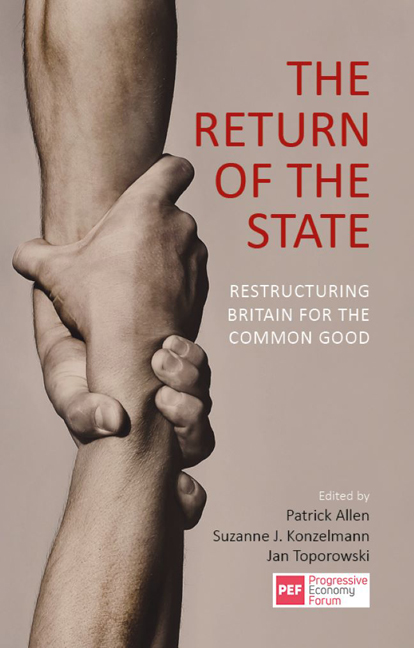17 - To restructure the British state, the international financial system must be transformed
Published online by Cambridge University Press: 22 December 2023
Summary
The Covid-19 crisis has demonstrated one important truth. The international financial system is designed on terms that suit the owners of capital, not on terms that suit nation states, or the majority of the population – as Geoff Tily explains in his chapter in this volume, Chapter 4. He writes that globalization is a system amounting to “internationalism on the terms of capital”, whereas internationalism should be set on terms that benefit the majority – the people who labour by hand and brain. In this chapter, I contend that no reform of the state “for the common good” is possible under terms governed by the current international system of deregulated, globalized capital, constructed on the foundation of vast debts, costly credit and tax evasion.
During the Covid-19 crisis world leaders proved unable to convene an international summit to prevent the spread of the pandemic and to collaborate on a vaccine for the world's people. Some deliberately attacked the system of multilateral coordination to defeat pandemics, organized under the umbrella of the World Health Organization. However, central bank governors, led by the Federal Reserve, did work together and coordinate to save globalized capital markets from the economic consequences of the pandemic. Even while the governments of Trump, Bolsonaro, Modi and Johnson clowned around, grievously mishandling the crisis and causing thousands to die unnecessarily, technocrats at the Federal Reserve, the Bank of England and the Bank of Japan engaged in decisive, expansive and internationally coordinated action to save rentier capitalism. Big Wall Street and City of London financial institutions, corporations such as Apple and the world's airlines quickly became beneficiaries of central bank largesse.
As the Brookings Institution has carefully documented, whereas ordinary Americans faced unemployment and income loss, the Federal Reserve effectively nationalized Wall Street – and, with it, other financial entrepôts. It did so by cutting its target for the federal funds rate, the rate US banks pay to borrow from each other overnight, to a range of 0 per cent to 0.25 per cent and by purchasing securities. Between mid-March and mid-June 2020 the Fed's portfolio of private assets grew from $3.9 trillion to $6.1 trillion. It relaunched the Money Market Mutual Fund Liquidity Facility (MMLF), which backstopped money market mutual funds and massively expanded its repurchase agreement (repo) operations to channel cash into the money markets.
- Type
- Chapter
- Information
- The Return of the StateRestructuring Britain for the Common Good, pp. 201 - 210Publisher: Agenda PublishingPrint publication year: 2021



